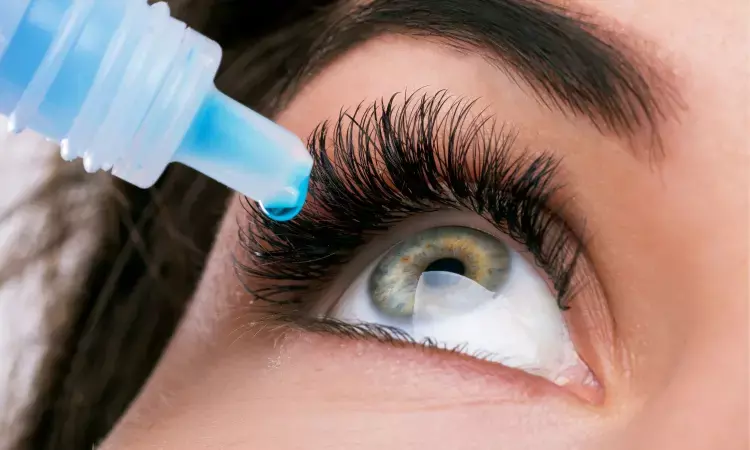- Home
- Medical news & Guidelines
- Anesthesiology
- Cardiology and CTVS
- Critical Care
- Dentistry
- Dermatology
- Diabetes and Endocrinology
- ENT
- Gastroenterology
- Medicine
- Nephrology
- Neurology
- Obstretics-Gynaecology
- Oncology
- Ophthalmology
- Orthopaedics
- Pediatrics-Neonatology
- Psychiatry
- Pulmonology
- Radiology
- Surgery
- Urology
- Laboratory Medicine
- Diet
- Nursing
- Paramedical
- Physiotherapy
- Health news
- Fact Check
- Bone Health Fact Check
- Brain Health Fact Check
- Cancer Related Fact Check
- Child Care Fact Check
- Dental and oral health fact check
- Diabetes and metabolic health fact check
- Diet and Nutrition Fact Check
- Eye and ENT Care Fact Check
- Fitness fact check
- Gut health fact check
- Heart health fact check
- Kidney health fact check
- Medical education fact check
- Men's health fact check
- Respiratory fact check
- Skin and hair care fact check
- Vaccine and Immunization fact check
- Women's health fact check
- AYUSH
- State News
- Andaman and Nicobar Islands
- Andhra Pradesh
- Arunachal Pradesh
- Assam
- Bihar
- Chandigarh
- Chattisgarh
- Dadra and Nagar Haveli
- Daman and Diu
- Delhi
- Goa
- Gujarat
- Haryana
- Himachal Pradesh
- Jammu & Kashmir
- Jharkhand
- Karnataka
- Kerala
- Ladakh
- Lakshadweep
- Madhya Pradesh
- Maharashtra
- Manipur
- Meghalaya
- Mizoram
- Nagaland
- Odisha
- Puducherry
- Punjab
- Rajasthan
- Sikkim
- Tamil Nadu
- Telangana
- Tripura
- Uttar Pradesh
- Uttrakhand
- West Bengal
- Medical Education
- Industry
Varenicline nasal spray may improve tear production in dry eye disease

Varenicline nasal spray effectively manages Dry Eye Disease and improves tear production and DED signs.
A recent study evaluating the efficacy of varenicline nasal spray (VNS) versus vehicle/placebo for treating dry eye disease has concluded that VNS use improves Schirmer test scores over 28 days of treatment.
They noted more incidence of cough and throat irritation in the VNS group.
The lead researcher of this study, “The efficacy and safety of varenicline nasal spray for the management of dry eye signs: a systematic review and meta-analysis”, is Dr Bader Bashrahil and is published in BMC Ophthalmology.
It is already known that the leading cause of DED is persistently unstable tear film causing ocular discomfort. This eye condition is treated using tear supplementation. Emerging evidence supports the effectiveness of nicotinic acetylcholine receptor (nAChR) agonists (e.g., varenicline and simpinicline) nasal sprays for managing DED.
In the present study, the team assessed the efficacy and safety of varenicline nasal spray (VNS) for DED treatment using databases like CENTRAL, Medline, and Embase.
The mean change in the anaesthetized STS or Schirmer test score, a measure of basal tear production, from baseline was the efficacy endpoint and serious adverse events (SAEs) and adverse events (AEs) were the safety endpoints.
The main Results of the study could be summarised as follows:
- A total of 3 RCTs with 1063 participants met the eligibility criteria and had a low risk of bias.
- On day 28, there was an increase in the mean STS change from baseline.
- There was no significant difference between VNS and placebo in SAE and ocular AE frequency.
- They found VNS had a substantial effect on developing nasal cavity-related AEs.
They said that VNS improved efficacy endpoints and increased the frequency of nasal cavity-related AEs like cough and throat irritation.
They noted there were neither SAEs nor ocular AEs.
The study limitations include low numbers, inconsistent pooled results and high heterogeneity.
They mentioned that upcoming studies should focus on comparing its safety and efficacy against currently established management options.
Further reading:
Bashrahil, B., Taher, N., Alzahrani, Z. et al. The efficacy and safety of varenicline nasal spray for the management of dry eye signs: a systematic review and meta-analysis. BMC Ophthalmol 23, 319 (2023). https://doi.org/10.1186/s12886-023-03069-y
BDS, MDS in Periodontics and Implantology
Dr. Aditi Yadav is a BDS, MDS in Periodontics and Implantology. She has a clinical experience of 5 years as a laser dental surgeon. She also has a Diploma in clinical research and pharmacovigilance and is a Certified data scientist. She is currently working as a content developer in e-health services. Dr. Yadav has a keen interest in Medical Journalism and is actively involved in Medical Research writing.
Dr Kamal Kant Kohli-MBBS, DTCD- a chest specialist with more than 30 years of practice and a flair for writing clinical articles, Dr Kamal Kant Kohli joined Medical Dialogues as a Chief Editor of Medical News. Besides writing articles, as an editor, he proofreads and verifies all the medical content published on Medical Dialogues including those coming from journals, studies,medical conferences,guidelines etc. Email: drkohli@medicaldialogues.in. Contact no. 011-43720751


